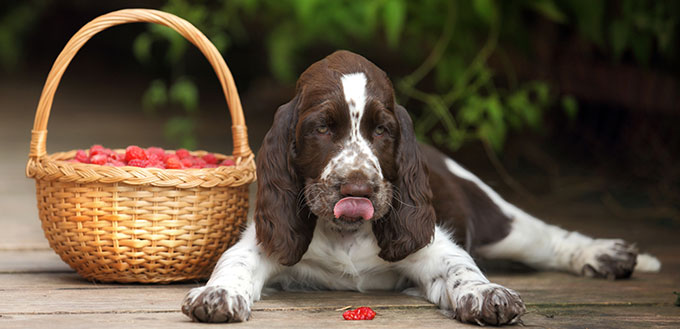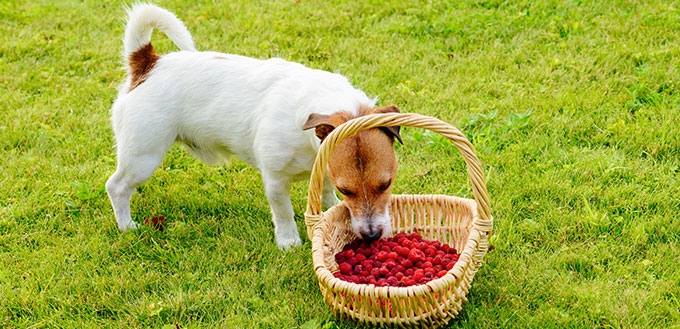While not all ‘human food’ is safe to give to your dog, there are some – fruit and veg in particular – which can be a tasty and even beneficial treat. And delicious and sweet raspberries are one of them.
But as with anything you give to your dog to eat, there are some things you need to be aware of. We delve deeper into the question, ‘can dogs eat raspberries?’ to give you the definitive answer.
Can Dogs Have Raspberries?
Yes, raspberries are safe for dogs and are in fact a tasty and healthy treat to give them. Unlike some fruits, such as grapes which can be toxic for pets, there is nothing toxic in raspberries and are perfectly safe for them to eat, but in moderation. And this is because they contain sugar, including natural xylitol, as well as being quite high in calories. More on this later.

What are the Benefits of Feeding Your Dog Raspberries?
So, are raspberries good for dogs? Fresh fruit and vegetables are a great source of vitamins and minerals, which both dogs and their pet parents can benefit from. The difference is that when it comes to fruits such as raspberries, it should only be fed to your dog as a treat rather than a daily part of their diet. And they don’t require much preparation, as just wash them thoroughly before you give them to your dog.
As long as your dog has a balanced daily dog food diet, they shouldn’t need raspberries to get their essential nutrients. However, when given in moderation, raspberries do have numerous benefits for dogs to eat:
A Good Source of Vitamins and Minerals
Raspberries, like most berries, are high in many natural compounds and essential nutrients, including vitamin C, which have many health benefits and can also help to reduce inflammation and cognitive aging as well as boost their immune system. These mini juicy fruits are also rich in vitamin A, B-complex and vitamin K (for healthy blood clotting), as well as minerals including folic acid, iron, magnesium and potassium for their general health, including strong teeth and a healthy skin and coat.
Packed with Antioxidants
Raspberries are also rich in powerful antioxidants, which fight free radicals and can lead to improved brain function health as well as help reduce the likelihood of heart disease, arthritis, diabetes and even cancer.
Good for Your Dog’s Digestive System
The dietary fiber in raspberries can keep your dog’s digestive system healthy as well as helping to keep them feeling fuller for longer and prevent weight gain.
Contain flavonoids
Flavonoids, with their anti inflammatory properties, are also found in raspberries, which can, in turn, help to reduce the risk of cardiovascular disease in your pet.
High Percentage of Water
Largely comprised of water – which is why they are so juicy – raspberries are a hydrating healthy snack that can be a refreshing treat on a hot day and help prevent dehydration.
When are Raspberries Bad for Your Fido?
The downside to raspberries is that they do contain a large amount of sugar, which, if eaten in excess will not only add to their daily calorie intake but can also irritate your dog’s digestive system. Too much sugar will also be detrimental for diabetic dogs.
Another important fact to know about raspberries is that they do contain the natural sweetener xylitol, which can be toxic for dogs if eaten in quantity. In fact, xylitol can cause can liver disease, kidney failure and hypoglycemia (low blood sugar) and if eaten to excess can even be life threatening.
Symptoms of xylitol poisoning include vomiting, diarrhea, confusion and ultimately collapse so if you are concerned in any way about how your dog is responding, do contact your vet.
But in general you shouldn’t be overly worried as the small amount of xylitol found in a raspberry will not be harmful (you’d need a significant quantity to be a fatal dose) but it is important that your dog is only ever given a few raspberries at a time to ensure they are safe for dogs. And they need to be fresh, and not canned, preserved or in syrup as this will all significantly up the sugar load.
And it is essential you avoid certain other berries totally – including holly berries and juniper berries – as these can be toxic to dogs.
How to Incorporate Raspberries in Your Dog’s Diet
When it comes to feeding raspberries – or other fruits– to your canine companions, it is important to always follow the ‘90/10’ rule and only feed them as you would any other treat. So, that means your dog’s total treat allowance should never be more than 10% off your pooch’s recommended daily calorie intake.
When it comes to feeding raspberries as a sweet treat to your pet, you can keep it simple and hand feed them a couple, ensuring they have been washed thoroughly first (especially if they are wild berries) to remove residual chemicals and check that they are not starting to go moldy – only give your dog fresh raspberries and never from a can. Frozen raspberries are also a good idea, especially on a hot day as a cooling dog treat. Just make sure you only feed frozen raspberries one at a time, under supervision in case they become a choking hazard.

Easy DIY Raspberry Dog Treats
Raspberries are also a great ingredient for DIY doggy treats such as:
Raspberry smoothie: Simply blend a handful of raspberries and a little banana with some low-fat plain yogurt in a food processor then pour into ice cube molds and freeze. One of the simplest frozen treats you can make for your dog!
Raspberry and chicken frozen bites: Mash some raspberries into a cup of chicken stock, then pour into some bone shaped molds and freeze to make a delicious savory/sweet treat!
Raspberry and pumpkin bakes: Mix ½ cup raspberries with ½ cup pumpkin puree and ½ cup brown flour, with half teaspoon of cinnamon. Mold into small balls, then bake for 15 minutes and cool.
Conclusion
So, there you have it, it’s a yes to the ‘can dogs eat raspberries’ question – in fact, they are packed full of nutritious, juicy goodness most dogs will love.
But there are caveats as raspberries are also full of sugar, including the potentially harmful xylitol. This means you should only feed your pooch raspberries in small quantities that are appropriate to your dog’s size and health and not every day. And can puppies eat raspberries too? Yes, but only under careful supervision.
FAQs:
Q: How often and how much raspberry can my dog eat?
A: As with any treat you give to your pooch, moderation is key, and they should be used as an occasional treat and not part of – or a substitute for – their daily dog food diet.
However, raspberries can only be dangerous in relation to the natural xylitol they contain – if eaten in excessive quantities. But this doesn’t mean you can go overboard with the number of raspberries you give to your pooch in one sitting, as the sugar contained in the fruit means excess calories your dog could do without. And you need to feed less to smaller dogs.
So, as a guide, raspberries should be limited to an occasional treat, and in small quantities – no more than just a few raspberries at a time, depending on the size of your pet to avoid them becoming a choking hazard.
Q: Can dogs be allergic to raspberries?
A: It is possible for a dog to be allergic to raspberries, just as they can be allergic to plants and other fruit, but it is pretty rare. The signs of an allergic reaction can include itching and dermatitis as well as wheezing, coughing, sneezing and potentially runny discharge from the eyes or nose or an upset stomach.
A more serious allergic reaction could lead to vomiting and/or diarrhea or respiratory issues. If you are in any way concerned about your dog, or they are demonstrating more severe reactions after eating a raspberry, seek veterinarian advice pronto.
Q: Can I give my dog frozen raspberries?
A: Yes, you can! In fact, a couple of frozen raspberries can be a cooling and delicious treat, especially on a hot summer’s day. Just one word of caution – to avoid a potential choke hazard, ensure the frozen raspberry is an appropriate and safe size for your particular dog and avoid giving them to puppies.







